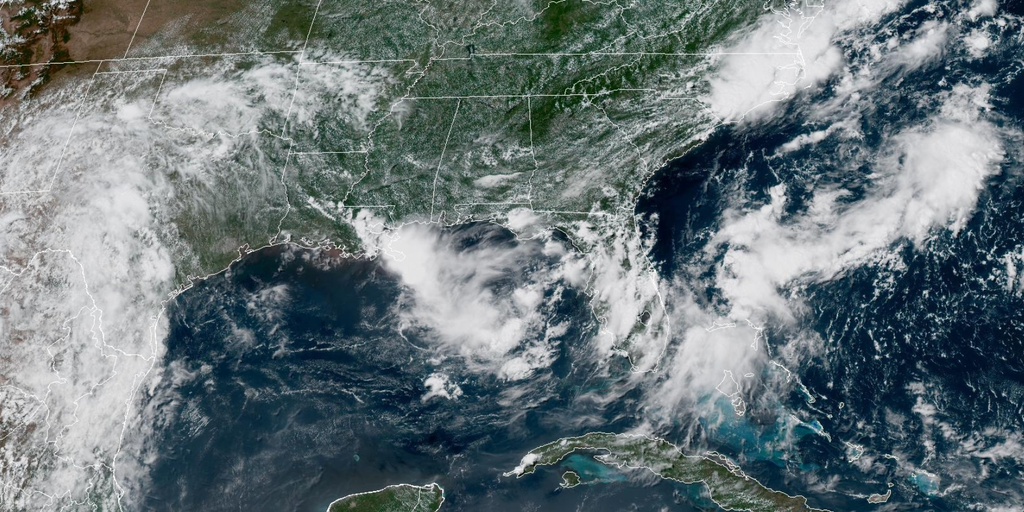Weather Uncertainty Looms Over Fourth of July Festivities in Florida
JACKSONVILLE, Fla. – As families set out to celebrate the Fourth of July, the sky above Florida grew dark with impending rain clouds, signaling a shift in plans for many. In a particularly vivid scene, children who had eagerly awaited fireworks on the beach found themselves rushing for shelter as torrential rain fell across coastal cities, turning sun-soaked festivities into soggy undertones of disappointment.
The Weather’s Unpredictability
The FOX Forecast Center reports that wet conditions gripping Florida stem from a combination of a weakening frontal boundary and rising tropical concerns. Bryan Norcross, a hurricane specialist at FOX Weather, explained the looming threats: “A cold front moving into the region brings with it a heavy chance of persistent rain, compounded by the warm waters off the southeast coast,” he noted. “If a tropical system develops, we’re left not just with a named storm but also increasing risks of localized flooding.”
The region has already seen widespread rainfall amounts ranging from 1 to 4 inches, with additional precipitation expected. “Historically, Fourth of July activities across Florida draw crowds to beaches, but this year, nature has its own agenda,” Norcross added. “There’s great uncertainty regarding tropical formation, but one thing remains clear: heavy thunderstorms will dominate the forecast.”
Potential for Tropical Development
Weather experts pinpoint a specific area off the coasts of the Carolinas, Georgia, and Florida as having a “medium chance” for tropical development over the upcoming week. The National Hurricane Center has categorized this region as a notable area of concern for potential cyclonic activity. According to a study conducted by the State University of Florida’s Meteorological Department, there is a correlation between elevated sea surface temperatures and the increase in tropical storms, emphasizing the ongoing threat posed by climate change.
- Increased rainfall: Expected totals of 1 to 5 inches this week.
- Enhanced risks of erosion: Particularly along vulnerable beaches.
- Tropical system watch: Medium chance noted by the National Hurricane Center.
“Even if the low-pressure system simply remains as it is, meaning no formal classification as a tropical depression or storm, heavy rains and storm patterns remain a serious issue for local communities,” Norcross stated. He referred to the fact that while named storms gain media attention, the actual weather impacts often remain unchanged. “If it develops, we may see a few headlines, but for people living here, it’s the flooding from stalled thunderstorms that poses the real danger.”
Travel Disruptions and Impact on Local Communities
Alongside the threat of rain, travel disruptions loom large. As families prepared for long-awaited vacations, many faced cancellations and delays, especially at major airports across the state. Local business owners voiced concerns as well, reporting that inclement weather could greatly affect their foot traffic during the holiday. “The Fourth of July is a pivotal time for our sales,” stated Jennifer Timmons, owner of a popular beach shop in St. Augustine. “Last year, we saw a surge in customers; this year, it’s a gamble we’re not certain we can afford.”
Local officials are urging caution as rip currents and beach erosion threats increase. Authorities have implemented safety measures along popular beaches, cautioning swimmers and surfers alike. “We’ve seen rip current incidents in the past when systems like this move into the area,” said Rick Barnes, a lifeguard supervisor for Duval County. “We want everyone to enjoy the water, but safety always comes first, especially during tumultuous weather conditions.”
What Lies Ahead
Experts from the National Oceanic and Atmospheric Administration (NOAA) acknowledge that while the Atlantic has seen two tropical systems form this season, they have carried little energy or longevity. Meteorologists utilize a metric known as Accumulated Cyclone Energy (ACE) to gauge storms’ intensity and duration. Current data suggests that the ACE for this season remains significantly below average, which has implications for storm readiness as the season progresses.
Norcross also highlighted, “This year’s storm season is an anomaly; while we might see increased cyclone count, their strength remains lacking. People should remain vigilant, not only now but as we move into the peak of hurricane season.”
As the rain continues to fall in varying intensities across the Sunshine State, Floridians are left with mixed feelings of celebration and anxiety. The once-promised beach days are now framed by gloomy skies, a sobering reminder of nature’s unpredictable temperament. As banners wave and fireworks attempt to pierce the clouds, many remain hopeful for a swift change in weather—just in time for the real celebrations to begin.





